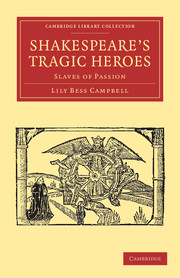PREFACE
Published online by Cambridge University Press: 07 September 2010
Summary
It was in 1898 that Sir Sidney Lee summarily disposed of future Shakespearean interpreters in the preface to his Life of William Shakespeare: “Aesthetic studies of Shakespeare abound, and to increase their number is a work of supererogation”. But in spite of this anathema the end was not yet. And in the criticism of the intervening thirty years there are two lines of interpretation that are to be specially remarked. In 1904 Professor A. C. Bradley's interpretation of Shakespearean tragedy, partly psychological and partly metaphysical, was to serve as a new landmark and a new point of departure in Shakespearean criticism—one may almost say in literary criticism. In 1907 Professor Dowden published in the Atlantic Monthly a paper on “Elizabethan Psychology”, which pointed toward an ideal of criticism on the basis of contemporary thought.
Professor Bradley began his analysis of Shakespeare's conception of tragedy by a discussion that implicitly accepted Aristotle's Poetics as the basis for differentiation. He questioned the mediaeval idea of tragedy, “a story of exceptional calamity leading to the death of a man in high estate”, as inadequate to explain Shakespeare in full, and he specifically affirmed that “the tragic world is a world of action, and action is the translation of thought into reality”. He concluded: “The tragic suffering and death arise from collision, not with a fate or blank power, but with a moral power, a power akin to all that we admire and revere in the characters themselves”.
- Type
- Chapter
- Information
- Shakespeare's Tragic HeroesSlaves of Passion, pp. v - viiiPublisher: Cambridge University PressPrint publication year: 2009First published in: 1930

